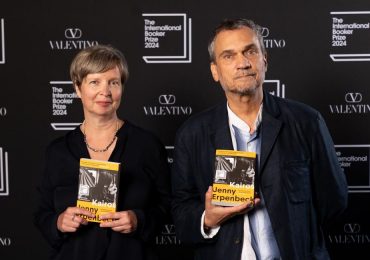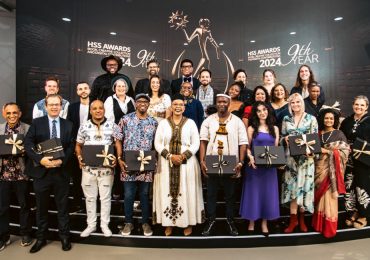Every year, speculation abounds about which author will win the Nobel Prize in Literature. This year, the Nobel Committee have provided us with a few hints. Read on …
Two Nobel Prizes in Literature will be announced today, after the announcement of the 2018 winner was postponed (more on this later).
The bookies’ odds are a traditional place to turn for tips, but they are far from reliable. In 2017, the last time a Nobel Prize in Literature was announced, Ngũgĩ wa Thiong’o was the odds-on favourite to win at both betting giants NicerOdds and Ladbrokes. Other names in the mix were Haruki Murakami, Joyce Carol Oates, Philip Roth, Amos Oz, Don DeLillo and Adonis. However the eventual winner, Kazuo Ishiguro, wasn’t even on the list.
Ngũgĩ and Haruki Murakami are perennial favourite to take the prize, and nothing is different this year. NicerOdds have the Kenyan legend at 8/1, alongside Russian writer Lyudmila Ulitskaya. Canadian Anne Carson is the bookies’ favourite, at 4/1, followed by Margaret Atwood (11/2), Maryse Condé (13/2—that would be cool), Olga Tokarczuk (7/1) and Lyudmila Ulitskaya (8/1). Trailing the pack at 10/1 are Murakami, László Krasznahorkai, Marilynne Robinson, Péter Nádas and Peter Handke. You can also take a bet on George RR Martin for 250/1, if you fancy those odds.
Perhaps because of unpredictable results in the past, Ladbrokes is not accepting bets on the prize this year.
Last year, Guadeloupean novelist Condé, the current favourite among those in the know, was the first and only winner of the New Academy Prize in Literature, a one-off award intended to fill the void left by the cancellation of the Nobel.
For the first time this year, Anders Olsson, the chair of the Nobel Committee in the Swedish Academy, has revealed some of what the academy is looking for in a laureate.
Historically, the Swedish Academy, who choose the winner, has been notoriously secretive about its workings. It does not publish a shortlist, or even a longlist. If you want to nominate a writer, you need to be a ‘qualified person’. How will you know you are a qualified person? The Swedish Academy will send you a letter informing you that you are. The names of the nominees and other information about the nominations cannot be revealed until fifty—that’s five-zero—years later.
The instructions for the prize that Alfred Nobel left in his will are also extremely vague: he stated that his prizes should go to people who, during the preceding year, ‘shall have conferred the greatest benefit to mankind’, and, specifically in the field of literature, the person who ‘shall have produced the most outstanding work of an idealistic tendency’. The meaning of the word ‘idealistic’ has been debated for over a hundred years.
The Swedish Academy was founded in 1786. Election is by secret ballot, and before a new member is accepted their name must be submitted to the Academy’s Patron, the King, for his approval. Until last year, membership was until death. Traditionally most members were ‘important officials’, but now ‘distinguished Swedish writers’ represent more than half, with the remainder made up of linguists, literary scholars and historians.
Since 1786 , just nine women have been admitted to the Academy. Of the 114 Nobel Laureates in Literature since Frenchman Sully Prudhomme won the first prize in 1901, only fourteen have been women. Just four have been from Africa.
In 2018, the Swedish Academy was rocked by a sexual abuse, harassment and corruption scandal, which resulted in the resignation of seven members. Large protests were held all over Sweden, and the 2018 edition of the award was cancelled. Jean-Claude Arnault, the French husband of academy member Katarina Frostenson, was accused of rape, and also of leaking the names of laureates. He is now in prison for rape. (This is the reason that two winners will be announced this year.) These events undoubtedly damaged the credibility of the Nobel Prize in Literature and the authority of the Academy. Perhaps this is the reason the Academy is giving us a glimpse into its workings this year.
- Read: ‘The Academy is no concentration camp’: Chairperson of the Nobel Committee for Literature Per Wästberg talks to The JRB about the current sexual abuse scandal
- See: Exclusive to The JRB: Photographs from the protest against the Nobel Prize in Literature sexual harassment scandal
In a video released on the Nobel Prize’s YouTube channel (what a time to be alive), Olsson explains how the Academy go about choosing a shortlist.
‘Every year, we receive about two hundred nominations coming to the Academy from all the world, and then our work starts,’ he says. ‘That is in the beginning of February each year, and it was like that this year, too.
‘Then we are reducing this great quantity of writers to eight, this year. And that is the shortlist, and the Academy has accepted this shortlist before summer vacation. So everyone in the Academy reads this shortlist during the summer, and out of this shortlist we pick the two laureates this year.’
Olsson also reveals that the Academy has altered the criteria by which they choose a winner, looking to a more diverse pool of candidates.
‘We do have criteria, and the criteria have changed,’ he says. ‘Now we are looking much more for the global totality. I mean, we have really, it’s necessary for us to widen our perspectives more and more. Previously we had more, let’s say, Eurocentric perspective of literature, and now we are looking all over the world.
‘And also, previously, it was much more male-oriented. Now we have so many female writers that are really great. So the prize and the whole process with the prize has been intensified and is much more broad in scope.’
But the Academy’s newfound transparency only goes so far, as Olsson stops short of giving away any suggestion as to who this year’s winner may be: ‘I’m sorry, I cannot give you any hints whatsoever. We have strict rules of secrecy, as you know.’
We know.





